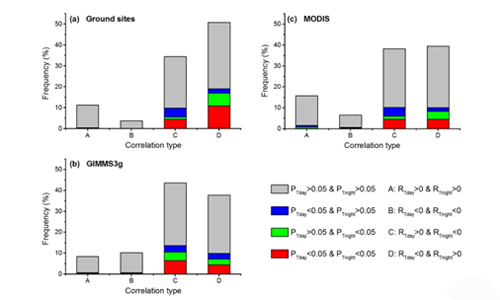
Plant phenology has been intensively studied because it is closely related with interannual variability of carbon captured by terrestrial ecosystems.
A research team led by Prof. WU Chaoyang from the Institute of Geographic Sciences and Natural Resources Research (IGSNRR), Chinese Academy of Sciences, and its collaborators found that autumn-leaf senescence responded oppositely to the increase of daytime and nighttime temperatures, and leaf senescence in the Northern Hemisphere would begin earlier than currently expected, causing a positive feedback on climate change.
In contrast to the well-known response of spring phenology to climate change, autumn phenology is more challenging to prdict.
Using long-term ground phenological records (14536 time series since the 1900s) and satellite greenness observations dating back to the 1980s, researchers reported an unrecognized opposite change of leaf senescence with daytime and nighttime warming. If higher daytime temperature led to an earlier or later leaf senescence, an increase in nighttime temperature systematically drived leaf senescence to occur oppositely.
Contrasting impacts of daytime and nighttime warming on drought stress might be the underlying mechanism for this opposing relationship.
This study changes the paradigm of prolonged growth by a higher autumn temperature, and predicts an earlier leaf senescence in the Northern Hemisphere, causing a positive feedback on climate change.
This work was published in Nature Climate Change, and it was funded by the Strategic Priority Research Program of the Chinese Academy of Sciences, and the National Natural Science Foundation of China.
 |
|
Contrasting responses of autumn-leaf senescence to daytime and nighttime warming using ground and satellite observations. (Image by WU Chaoyang) |

86-10-68597521 (day)
86-10-68597289 (night)

52 Sanlihe Rd., Xicheng District,
Beijing, China (100864)

